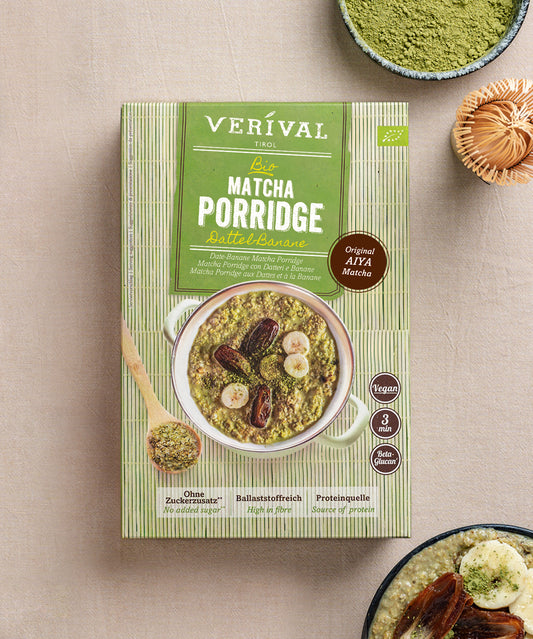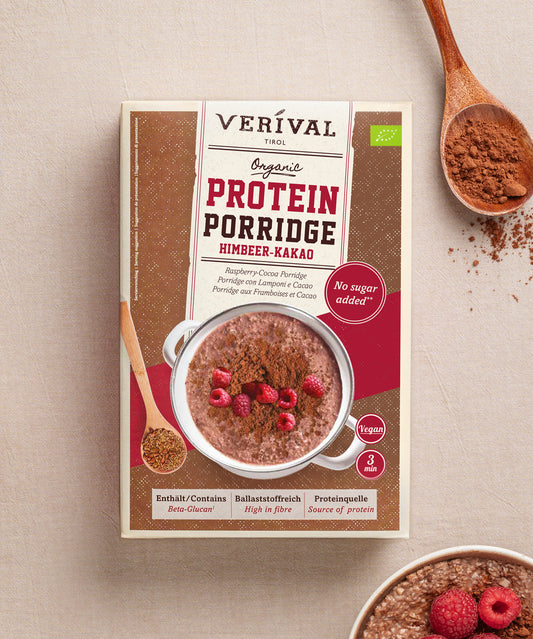Anyone who has irritable bowel syndrome knows the problem: eating spontaneously often leads to discomfort, and even healthy foods can cause stomach ache or flatulence. Especially in stressful times, it can be difficult to always make the right decisions. Meal prep – i.e. consciously preparing meals in advance – can help enormously here. With a little planning, you can ensure that you always have something suitable on hand that is good for your gut and makes your everyday life easier. In this article, you will learn why meal prep is useful for irritable bowel syndrome, how to get started and which recipes really work.
Verival Porridge – the classic breakfast!
What exactly is irritable bowel syndrome?
Irritable bowel syndrome (IBS) is one of the most common functional gastrointestinal disorders. Millions of people suffer from it, often without knowing the exact cause. The symptoms vary greatly from person to person – and that is precisely what makes dealing with it so challenging.
Typical symptoms of irritable bowel syndrome
The most common signs are:
- Abdominal pain and cramps
- Flatulence and a bloated stomach
- Diarrhoea, constipation or alternating between the two
- The feeling of not being completely empty after going to the toilet
These symptoms often occur in episodes, but can also be chronic. What makes them particularly stressful is that they are unpredictable and often occur in stressful situations or after certain meals.
Possible causes of intestinal problems
Research suggests that several factors interact:
- a disturbed gut-brain axis (the nervous system in the gut is hypersensitive),
- changes in the microbiome, i.e. the gut flora,
- intolerances to certain food components,
- stress and psychological strain.
There is no ‘single cause’ – irritable bowel syndrome is complex and individual. That is why there is no standard treatment. Diet, stress management and a mindful lifestyle are the most important factors you can influence.
What is meal prep?
Meal prep is short for ‘meal preparation’, i.e. consciously preparing meals in advance. Essentially, it means making a plan of what meals you want to eat in the coming days and preparing them in such a way that all you have to do is reheat or assemble them. This may sound like a lot of effort at first, but it saves you a lot of time and stress in everyday life.
It's important to note that meal prep is more than the stereotypical image of identical plastic boxes all containing the same thing. It's more about structure and the secure feeling that you can always fall back on wholesome, home-cooked meals. Some people cook complete meals in advance, others prepare individual components such as rice, vegetables or oatmeal and combine them flexibly later. Others focus on preparing at least breakfast and snacks so that they can start the day in a relaxed manner.
The beauty of meal prep is its versatility. You can plan it out strictly or keep it loose, you can cook for two days or for a whole week. The key is that you have less stress, gain more control over your diet and don't have to constantly wonder what to eat next.
Why meal prep can help with irritable bowel syndrome
Meal prep can be a real game changer, especially if you struggle with irritable bowel syndrome. The reason is simple: your digestive system is sensitive, and spontaneous meals always carry a risk. A quick snack from the bakery or an improvised dinner after a long day at work can trigger symptoms such as flatulence, abdominal pain or diarrhoea – simply because you had no control over the ingredients, preparation and portion size.
Meal prep takes away this uncertainty. You know exactly what's in your food and can specifically choose foods that you tolerate well. This way, you avoid unnecessary irritation to your gut and reduce the risk of unpredictable flare-ups. Planning also brings structure to your everyday life. You don't have to decide what to put on your plate at the last minute, but always have a suitable meal at hand. This not only relaxes your stomach, but also your mind – and less stress automatically means fewer symptoms.
Another advantage is portion control. Many people with irritable bowel syndrome tolerate smaller, regular meals better than large portions. If you prepare your food in advance, you can plan exactly the amount that is good for you. At the same time, it is easier to fall back on tried-and-tested recipes and thus create routines that give your body security.
Irritable bowel syndrome & nutrition – the challenges of everyday life
Living with irritable bowel syndrome is characterised by uncertainty. Some days you seem to be able to tolerate all foods, while on other days even a small trigger is enough to completely upset your stomach. This makes nutrition a daily challenge, because you cannot always predict how your body will react. And this is precisely why good planning is so crucial.
Spontaneous discomfort as a constant companion
One of the biggest problems with irritable bowel syndrome is the unpredictability of the symptoms. A spontaneous lunch with colleagues or a quick snack between meals can cause your stomach to rebel hours later. Flatulence, pain or an uncomfortably bloated stomach often appear out of nowhere and make it difficult to go about your daily life in a relaxed manner. For many sufferers, the fear of such situations leads them to avoid invitations or play it safe – which in turn robs them of their quality of life.
Time and energy problems in everyday life
In addition to the symptoms themselves, it is often external circumstances that make dealing with irritable bowel syndrome difficult. After a long day at work, you sometimes lack the energy to cook a fresh, easily digestible meal. Instead, you reach for ready-made products or snacks that are quickly available but not good for your gut. Even when you're on the go, there's often no time to search for stomach-friendly options. This creates a cycle of stress, inappropriate food and renewed discomfort.
This is exactly where meal prep can make a decisive difference. If you have meals already prepared, you don't have to improvise at the last minute. You always have something on hand that's good for you, giving your body the security it needs.
FODMAPs – what are they and what do they mean for you?
When it comes to nutrition for irritable bowel syndrome, you can't avoid the term FODMAPs. It sounds complicated, but it basically just describes a group of certain carbohydrates that are difficult to digest in the gut and can therefore cause discomfort.
What exactly are FODMAPs?
The term is an abbreviation for ‘fermentable oligo-, di-, monosaccharides and polyols’. These are sugars and sugar alcohols that are not completely absorbed in the small intestine. They reach the large intestine, where bacteria ferment them. This leads to gas formation, bloating and pressure in the abdomen. At the same time, they draw water into the intestine, which can cause diarrhoea.
Foods high in FODMAPs include wheat, rye, certain fruits such as apples and pears, dairy products containing lactose, and sugar alcohols such as sorbitol and mannitol.
What does this mean for you in everyday life?
If you have irritable bowel syndrome, your stomach is particularly sensitive to these carbohydrates. However, this does not mean that you have to strictly avoid all FODMAPs. It is often a matter of finding out which foods cause you problems and which you can tolerate in small quantities. A low-FODMAP diet is a helpful tool for reducing symptoms – but it should not be seen as a restrictive diet, but rather as a means of getting to know your body better.
Meal prep gives you the chance to do just that. You can consciously plan meals that are low in FODMAPs and don't have to risk eating the wrong thing when you're out and about. This gives you more security and allows you to calm your gut bit by bit.
Meal prep in practice – 6 simple tips to get you started
Meal prep sounds simple in theory, but in everyday life you may ask yourself, ‘Where do I start?’ Especially with irritable bowel syndrome, it is important to make the start as relaxed as possible. You don't have to cook complicated recipes or spend hours in the kitchen. The key is to establish structures that make your everyday life easier.
Plan wisely instead of striving for perfection
The first step is always planning. Think about which meals you know from experience are good for you and which ingredients you can tolerate without any problems. Write a plan for two to three days instead of preparing for a whole week. This will help you avoid stress and quickly see how well it works. Even small preparations – such as cutting vegetables or portioning snacks – can make a big difference.
Prepare what really helps
Many people make the mistake of starting too elaborately. Simple basic ingredients that you can combine flexibly are sufficient. For example, cook a larger portion of rice or quinoa, cook some vegetables and prepare a sauce that is easy to digest. This gives you the basis for various meals. Breakfast is also easy to prepare: overnight oats or homemade porridge that you just need to heat up are ideal options.
It's also important to keep the portions realistic. It's better to have several small boxes for between meals than one large meal that overwhelms you. This allows you to eat flexibly when your stomach allows.
Meal prep is therefore not a rigid concept, but a tool that you can adapt to your needs. Over time, you will develop routines that not only make your stomach feel better, but also clear your head.
Discover our healthy Verival snacks here!
Whether it's breakfast, lunch or dinner – meal prep is always a solution!
Many people only think of lunch at the office when they think of meal prep. But with a little planning, you can prepare every meal of the day – and that's exactly what makes it so valuable for people with irritable bowel syndrome. Whether it's morning, noon or evening, if you've prepared something, you don't have to improvise and can avoid unnecessary triggers.
Start your day without stress
The morning often determines how your stomach will behave for the rest of the day. With a prepared breakfast, you can start gently, without rushing and without risky foods. Overnight oats, porridge or a homemade rice cake snack can be prepared the night before and are ready to eat in the morning. This way, you can avoid the typical temptation to grab a quick but hard-to-digest pastry from the bakery.
Lunch that gives you peace of mind
Lunch can be a challenge, especially at work or on the go. Canteen food or takeaways often contain hidden ingredients that can cause problems for your gut. Meal prep takes away this uncertainty. Simple dishes such as a portion of rice with cooked vegetables and some easily digestible protein (e.g. chicken or tofu) are easy to prepare and take with you in boxes. Your lunch will then not only be easy on the stomach, but also stress-free.
Enjoy a relaxed dinner
In the evening, you often lack the energy to cook a big meal – and that's when you tend to reach for snacks or quick ready meals. Meal prep can help you avoid this. For example, cook a soup or stew in advance that can be easily reheated. Or prepare a portion of millet or potatoes that you can simply combine in the evening. This way, you'll go to bed feeling full but not overloaded – and your stomach can recover overnight.
How you can take care of your gut at breakfast
For many people with irritable bowel syndrome, breakfast is a delicate moment. Your stomach is still sensitive after the night, and the first meal often determines how stable your digestive system will remain throughout the day. A gentle, well-planned breakfast can prevent discomfort, while an ill-considered start can immediately trigger problems.
Gentle foundations for the day
Start the day with easily digestible and gentle foods. Oatmeal, millet or rice flakes are perfect for this because they do not irritate your stomach and keep you feeling full for a long time. Warm meals such as porridge or gruel are particularly beneficial as they calm the stomach and gently stimulate the metabolism. Mild fruits such as bananas, blueberries or stewed apples are also good choices, while acidic varieties such as oranges or pineapples often exacerbate symptoms.
Another point to consider is portion size. Many people with irritable bowel syndrome tolerate smaller, regular meals better than large portions. A moderate breakfast that is not too heavy on the stomach is therefore a good strategy for starting your day on a stable note.
Choose your drinks carefully
What you drink also makes a difference to how your day begins. For many people, coffee on an empty stomach is a guarantee of stomach problems because it stimulates stomach acid production and accelerates bowel activity. A more tolerable alternative is herbal tea, for example made from fennel, aniseed or camomile. A glass of lukewarm water in the morning can also work wonders because it gently activates the circulation and stimulates digestion without causing strain.
Why routine helps you
Your gut loves regularity. When you eat similar, easily digestible foods every morning, you give your digestive system a sense of reliability. Instead of being confronted with new stimuli every day, your body can adapt to the familiar structures and react more calmly. Meal prep makes this particularly easy: you prepare your breakfast the night before and can start the day relaxed and without rushing.
The 3 best meal prep recipes for irritable bowel syndrome
If you live with irritable bowel syndrome, you need recipes that are not only delicious, but also easily digestible and simple to prepare. Meal prep helps you do just that: you cook once and have several meals to fall back on. Here are three everyday recipes with precise steps that are good for your tummy.
1. Overnight oats with banana and blueberries
Ingredients for 2 servings:
- 6 tbsp soft oat flakes
- 200 ml oat milk (or another easily digestible plant-based milk)
- 1 ripe banana
- 1 handful of blueberries (fresh or frozen)
- 1 tsp ground flaxseed (optional)
Preparation:
- Put the oat flakes and flaxseed in two sealable jars or bowls.
- Pour the oat milk over them and stir well until the flakes are covered.
- Mash the banana with a fork and mix it evenly into the oat flakes.
- Add the blueberries.
- Seal the jars and leave to soak overnight in the fridge.
- In the morning, just open and enjoy – cold or slightly warmed if desired.
2. Quinoa and vegetable bowl with chicken or tofu
Ingredients for 3 servings:
- 150 g quinoa
- 1 small courgette
- 2 carrots
- 150 g broccoli
- 250 g chicken breast or firm tofu
- 2 tbsp olive oil
- Salt, pepper, fresh herbs to taste
Preparation:
- Rinse the quinoa thoroughly in a sieve to remove any bitter substances. Then simmer in a saucepan with twice the amount of water (approx. 300 ml) for 15 minutes. Then leave to soak for 5 minutes.
- Wash and chop the vegetables and cook in lightly salted water or in a steamer until al dente.
- Cut the chicken breast into strips and fry in a pan with 1 tbsp olive oil until golden brown. For tofu: dice and fry in the same way.
- Divide the quinoa, vegetables and protein into three boxes.
- Drizzle with the remaining olive oil and sprinkle with fresh herbs.
Keeps in the refrigerator for 3 days and tastes good warm or cold.
3. Millet casserole with apple and cinnamon
Ingredients for 4 servings:
- 200 g millet
- 500 ml oat milk
- 2 apples (mild, e.g. Gala or Jonagold)
- 1 tsp cinnamon
- 1 tbsp maple syrup or rice syrup (optional)
Preparation:
- Wash the millet thoroughly and bring to the boil with the oat milk in a saucepan. Simmer on a low heat for about 10–12 minutes until the millet is soft.
- Peel and core the apples and cut into small cubes. Steam briefly in a pan with a little water until soft.
- Mix the millet with the apple pieces, cinnamon and maple syrup.
- Pour the mixture into a small baking dish and smooth the top.
- Bake in the oven at 180 °C top/bottom heat for about 20 minutes.
- Leave to cool and cut into 4 portions.
High-fibre Verival breakfast – discover it here!
Conclusion: eat more relaxed with planning
Irritable bowel syndrome does not mean that eating has to be a constant source of stress. With meal prep, you have a tool at your disposal that gives you back control, security and peace of mind. You know what's in your meals, you can take your individual tolerances into account and you're well taken care of even in stressful situations. This takes the pressure off your stomach and your mind. Start small, find your own routines and build a system that suits you step by step. This way, eating becomes what it should be again: enjoyment without regret.
























